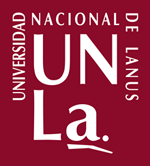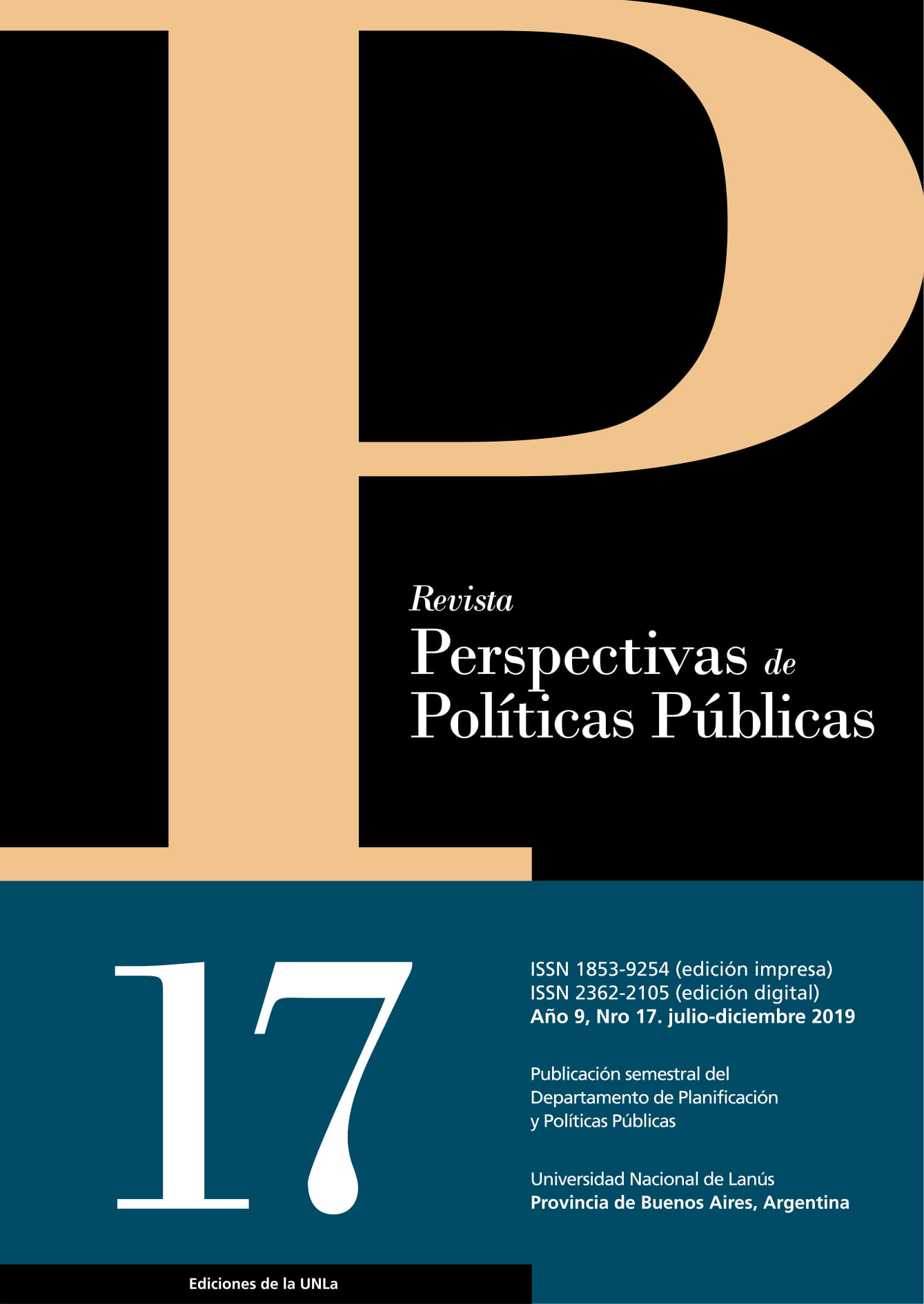Editorial of Perspective of public policies review N 17 Vol. 9 2019
Abstract
The articles that make up this issue cover a wide range of topics: the ecological impact of some productive practices, the constitution of the subjects of public policies by the policies themselves, the scope and limitations in the effectiveness of social participation according to the issues that motivate it, the levels in which it operates and the political system that frames it; the institutional organization of power and the negotiation and confrontation strategies to which the actors resort in certain contexts and moments.
María Emilia Val's text on the process of restructuring Argentina's external debt in 2005 studies the sovereign debt negotiation strategy developed by the government of Néstor Kirchner, with an orientation that would continue until 2015, setting a novel precedent regarding the policy with which the states can promote debt restructuring processes in the current stage of financial globalization. It is particularly appropriate to return to that experience at a time when Argentina has been led to gigantic indebtedness for reckless and misguided government management - judging by the results, which are what counts in terms of political action - generating an economic, financial crisis. and social depth and dimensions unparalleled in the last seventy years. Val's article allows us to appreciate the subtlety of the Argentine strategy that, in a framework of explicit adversity with the creditor bloc, at the same time knew how to take advantage of internal or specific differences between different creditors, and between them and their political guarantors, to optimize the perspectives of success.
One of the greatest liabilities of capitalism throughout its history is the environmental one. Two articles analyze two aspects of the issue. Soledad Nión Celio deals with the social construction of risk in the production of soybeans in Uruguay, based on the perception of different actors - an issue that fully touches Argentina. This item is taken as an example of the changes that agricultural production has experienced in recent decades. Martha Jhiannina Cárdenas Ruiz and María dos Dôres Saraiva de Loreto present the results of a qualitative study on informal mining in a region of Peru and its effects on the quality of life of the families involved in the activity.
The text of Jimena Pesquero Bordón focuses on the role of the vice government in the politics of three Patagonian provinces in recent years. The work opens the way for the study of an issue that until now had been ignored by the "subnational" political analysis. The author emphasizes the strategic relevance that the figure of the Vice Governor usually plays in certain institutional situations and the counterpoint of political games that develop within the respective provinces around the Governor / Vice Governor relationship and the gravitation of that relationship in provincial policy and in its articulation with the federal political system. For its part, Catalina Luz Bressán's article is part of the contemporary theoretical reflection on the relationship between the scale of citizen participation and democracy. Criticisms of the effective modalities in which “transitions to democracy” developed in several countries of our region, in particular what these criticisms posed as a growing distance between formal political systems and the demands of broad sectors of citizenship, led to exalt the virtues of the local, the direct, possibly the immediate, to the detriment of representative democracy practices oriented in the best case towards issues and with approaches alien to the specific problems of citizens and to an effectively democratic participation, generating a vision of the local as an idealized area of participation and deepening of democracy. On the contrary, the author argues that democratic participation is not condemned to the limits of the small scale; maintains that democracy is strengthened the greater the scale of participation as it allows to achieve a citizen involvement of better quality and politicity. "Who nominates dominates" says the old apothegm; naming means identifying and also calling, questioning someone or something, constituting it as a subject or object. The state names through its policies and the tools it uses to achieve its objectives. María Florencia Marcos' article inquires about the production of rural development subjects based on the analysis of the Social Agricultural Program (PSA), a state policy that was developed in Argentina between 1993 and 2013. onstitutes the subject; more often the name, the word, does not change, but the identity mutation occurs as a result of substantive policies, particularly those aimed at empowering its recipients. This is the case of Conectar Igualdad, to which Victoria Matozo's article is dedicated. Conectar Igualdad was one of the best known and possibly successful programs designed and promoted by the government of President Cristina Fernández de Kirchner, later dismantled and concluded by the Cambiemos Alliance government. It was also a program surrounded by some controversies, referring to the role of ANSES in its implementation and financing, and how to classify the program within the rigidities of academic classifications: social policy? Educational policy? Technological democratization? - not to mention the deployment of denigrative adjectives and social prejudices that were directed against the program and its beneficiaries. Victoria Matozo's article gets into the discussion from a rights perspective, debating with some social questions, popularized by the media, about the recipients of the program and its scope in relation to the objectives of this policy. The massive student mobilizations that took place in Chile in the 1990s and in recent years highlighted, in the field of public education, the limitations of a firmly structured representative democratic system and the inevitability of the formulation of participation claims and greater democratization far beyond the local level. Braulio Carimán Linares focuses them using theoretical methodological approaches developed in the study of social movements and the analysis of public policies. The article also shows the challenges that student demands posed to successive Democratic Concertación government and the different responses with which they tried to agree with organizations, against the background of a power structure that, in the economic-financial field, maintained continuities with which he had supported the military regime that was installed in 1973.






